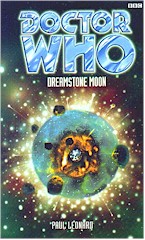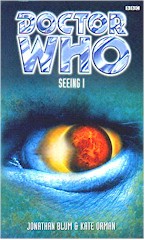Sam is Missing
A Story Arc
|
|
BBC Books Sam is Missing A Story Arc |
| Published |  |
 |
| 1998 |  |
 |
| Synopsis: This one speaks for itself. |
Worst, Better, Better, Best by Daniel Coggins 10/6/98
How can I describe the Sam is Missing series? Think of a ladder. Now the first in the series is at the total bottom, of any BBC book. Dullest Day is, quite frankly, appalling and a travesty of a Doctor Who story. Boring characters in boring and unexplained situations, monsters like something out of a terrifying cross between a late night horror movie and another type of late night show (you work it out :-*), it only becomes at all important during Seeing I, and then references are explained.
We'll press swiftly on... Legacy of the Daleks is better than the author's previous BBCB, but that's not really an accomplishment. Sam is not present at all, we get a no-shock appearance villain, the (Gluurk! ...censored) and another ending which simply makes another novel visible. (Are they going to make a "Susan Who"((She is his granddaughter)) story?)
Dreamstone Moon is still better (not hard at all) but quickly leaves you feeling lost and alone, completely confused about the story's purpose and plot. What is going on? The perfect remedy to all this strife then, is Seeing I (respectful silence). Probably the best BBCB, it is, quite frankly, superb. Sam, for want of a better word, regenerates. She is now a completely new companion. I am waiting with baited breath for the next novel. A wonderful set of interesting baddies, a race of technology farmers and a wonderful AI character. I can't really say more without giving the plot away.
My overall opinion is just to buy Seeing I , Dreamstone Moon and possibly Legacy of the Daleks. Avoid Longest Day with the stubbornness of the Brig. First half 4/10, second half 9/10 (8 & 10)
A discussion of the 1998 EDAs in the context of the BBC's first story arc by Robert Smith? 14/6/01
1998 was, sadly, one of the worst years in the history of ongoing original Doctor Who fiction. From the outset the BBC novels proved that they were far more resilient than anyone could have guessed. The early problems weren't just due to the Nuala Buffini approach; instead the books continued to underperform. There were a few strong showings, and an actual attempt to link stories together to provide more depth and reward regular readers, but on the whole the books had far more misses than hits.
One of the major problems, as shown by 1998 as a whole, was that the hits seemed to have no effect whatsoever on the rest of the range. Alien Bodies magnificently failed to inspire any subsequent books for a full year and a half after its publication. The Scarlet Empress did not provoke the predicted shift in the fundamental nature of storytelling in Doctor Who. And as for Seeing I's development of a certain companion...
One is tempted to blame the problems on editorial apathy (except that Steve Cole was actively editing and guiding the range at this point), the writers not talking to each other (except that there was a mailing list for all the online authors and a great deal of communication with the offline authors as well) or perhaps even a higher level BBC conspiracy (except that it's unlikely they cared one way or the other).
Instead the real problems were the regulars that the line was saddled with. The eighth Doctor's character is a subtle one and with only the distant memory of the TV movie to play off, the writers were left struggling to define any sort of character for him. His only real character trait was a tendency to say "Monosyllable, monosyllable, monosyllable, monosyllable, monosyllable" at every opportunity. You can imagine how few times he had to say that until we started bleeding from the ears. The Doctor's actions became more and more stupid with every passing book, until online reviewers could actually refer to him as "the congenital idiot" and everyone knew which incarnation of the Doctor they meant.
The books launched their first story arc in an attempt to counter the line's most serious problem: Sam Jones. Sam was the worst companion since Adric and for reasons unknowable to man, the editors simply wouldn't get rid of her. A story arc was also a good idea for the range at this point. The disconnected nature of the previous stories left them feeling irrelevant, so an overarching story was more than due. The idea wasn't too bad either: Sam goes missing and the Doctor has to search for her. Unfortunately, the execution left a great deal to be desired.
Longest Day was one of the worst written books we'd ever seen. The book was crammed full of interesting ideas, which was a novelty for an eighth Doctor novel at this point, but the author didn't know how to write any of them. Legacy of the Daleks was mindless fluff. The lack of Sam was its best point, but it featured a host of returning characters, not one of whom had any depth whatsoever.
Dreamstone Moon tried hard, but never really came together. However, Seeing I was the first good book since Alien Bodies and actually picked up on a few story threads. It was a surprisingly touching and powerful novel, with both the Doctor and Sam managing to be real characters for once. It took place over a period of three years and added much needed depth to both the Doctor and especially Sam. At the end, the books were in a better position than they'd ever been: a four book arc had changed Sam forever. She was no longer the annoying teenager with a list of causes a mile long and an inch deep. Instead she was now 21 and had gone through actual life experiences, leaving her mature and wiser in the ways of the world.
At least, that's how it should have been.
Looking back now shows just how inconsequential Seeing I was. The appalling Placebo Effect defined far more of the line's future than the supposed breakout novel preceding it. Immediately following the story arc that the editor himself planned out, we see Sam back to her old shallow self, spouting off about things she knew nothing about and managing to annoy everyone in sight (especially the readers). Vanderdeken's Children devolved Sam into a ten year old, but no one noticed the difference. In The Janus Conjunction it's painfully obvious that even the author detested Sam, but somehow she carried on relentlessly. The books went on their merry way, starring the congenital idiot and the list of causes that no one liked.
The year closed with Beltempest, a hugely terrifying epic squeezed into 249 pages that served as perhaps the ultimate comment on what the regulars had become. The Doctor was a grinning buffoon, with no plan and no ideas. Sam, on the other hand, was Dangerous. She took her pet causes to their extremes, becoming immortal in the process and inflicting her own brand of liberal do-gooding on others, whether they wanted it or not. This TARDIS crew was a terrifying one.
And so 1998 ended and we all breathed a sigh of relief. The books proved that they were going to do their own thing, no matter how stupid it might be. Despite the worthy attempts of the authors, the editor and the hapless cries of readers everywhere, the novels continued to suck. Every positive step was immediately undone in an attempt to keep the books on some sort of track that no one understood. The 1998 BBC books had started out with the best of intentions and then kept relentlessly hitting us with their own brand of stupid idealism. A bit like Sam herself, really.